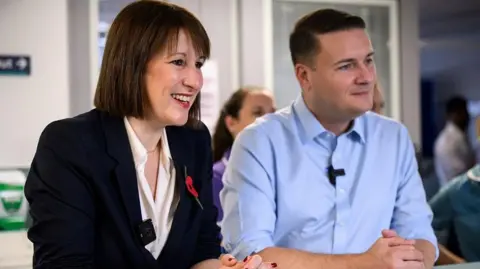Chancellor sets out new funding for extra NHS appointments
The government says it will invest £1.57bn in new equipment and buildings, in a bid to increase appointments.

 Reuters
ReutersThe government has announced more details of what is in this week’s Budget for the NHS – including £1.57bn for new surgical hubs, scanners and radiotherapy machines.
The funding is part of the government’s overall pledge to increase the number of NHS hospital appointments and procedures in England by 40,000 per week.
Health Secretary Wes Streeting said the Budget will help to “start fixing the foundation” of the NHS – but warned it “will take time to turn the situation around”.
Health experts have welcomed the new funding but cautioned there were many unanswered questions about future policy with the government’s 10-year NHS plan not published until next spring.
Full details of the government’s funding plans will come in Wednesday’s Budget.
Streeting has repeatedly said “the NHS is broken” since taking on the role in the summer.
The latest waiting time figures for the NHS in England show the backlog for hospital care is 7.64 million. Before the pandemic, it was just over four million.
In August, more than 280,000 people had been waiting for an operation, scan or appointment for more than a year.
And last month, a damning report warned that the NHS in England was in a “critical condition”, falling well short of its key targets for cancer, emergency (A&E) and hospital treatment.
What has been announced?
Soon after the election, the new government allocated £1.8bn to cover work by hospitals in England to reduce waiting lists for planned treatment and appointments.
That was new money from the Treasury.
The chancellor has said more funding will be provided to help the NHS deliver the extra 40,000 appointments and procedures per week – or more than two million a year – promised in the Labour manifesto.
The government now says there will also be an extra £1.57bn of capital investment – that is spending on equipment and buildings – that will come through in the next financial year.
Speaking on BBC Breakfast, Streeting said this includes funds to double the number of diagnostic scanners with AI enabled technology, which he said would mean less staff would be needed to diagnose illnesses.
The Treasury has not yet published the overall spending numbers for the NHS in England and the Department of Health and Social Care for this year and next – that will come in the Budget.
Only then will it be possible to judge how these spending figures compare with the previous trend, which saw average annual real increases of 3% in recent decades.
Extra money announced by the Westminster government generates more for Scotland, Wales and Northern Ireland as well.
Speaking to reporters on Monday, Chancellor Rachel Reeves said the NHS was “the lifeblood of Britain” and that is why she is “putting an end to the neglect and underinvestment it has seen for over a decade”.
“We will be known as the government that took the NHS from its worst crisis in its history, got it back on its feet again and made it fit for the bright future ahead of it,” she said.
Asked if the Budget would fix the NHS, Reeves said “I don’t think in one Budget you can undo 14 years of damage”.
But she said this Budget will “provide the resource necessary” to deliver the extra 40,000 appointments a week, reduce the backlog and increase the spending on equipment and buildings.
Streeting said the move would help to “arrest the decline” in the health service – but warned there could still be patients waiting on trolleys and in corridors this winter.
“Our NHS is broken but it’s not beaten and this budget is the moment we start to fix it,” he said.
Alongside the extra funding, he said “crack teams of top surgeons” would be sent to hospitals across the country to help them treat more patients “and make the money go further”.
More investment called for
Siva Anandaciva, chief analyst at The King’s Fund, said there was still more work to do.
“The sums announced today must be the first but not final word if the government is going to meet its ambitions to deliver an NHS that is fit for the future.”
The existing backlog of NHS maintenance issues with building and equipment already stands at a “staggering” £13.8bn, he said.
Saffron Cordery, NHS Providers deputy chief executive, said the funding was a “welcome addition”, but warned the service needed “significantly more investment”.
“This has to be a long term endeavour, not just the investment in capital but in running costs. The two need to go hand in hand,” she told the BBC Radio 4’s Today Programme.
In addition to investment, the NHS also needs enough staff to take on extra shifts, which is a challenge when vacancies are high and staff are feeling overworked and under pressure.
The government said Wednesday’s budget would set out its plans for fixing the NHS and rebuilding Britain.
A Conservative Party spokesman said: “We delivered record funding, overhauled productivity and delivered the first NHS Long Term Workforce Plan to support the health service recover from the pandemic and respond to a growing and ageing population.
“If Labour are serious about ensuring the NHS delivers for patients, they must continue this reform instead of holding yet further consultations. The health secretary promised no more money without reform – but where is it?”
Liberal Democrat Health and Social Care spokeswoman Helen Morgan said: “Until the government gets a grip of social care, hospitals will remain overwhelmed, and patients will pay the price.”








